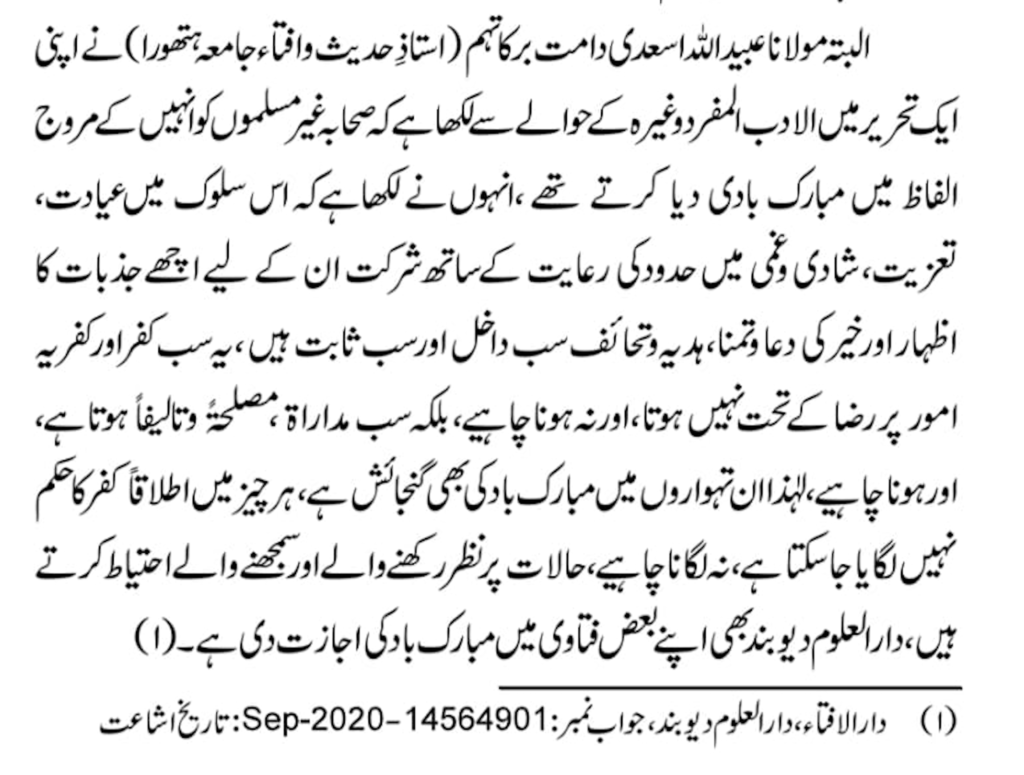Answered by Shaykh Yūsuf Badāt
Question:
I come from a practicing muslim household. In Canada, I work and live among non-muslims. Every Christmas my co-workers and neighbours say, “Merry Christmas” to me and give gifts. Islamicaly, is it permissible for me to also say “Merry Christmas” back to them as well as accept and offer gifts, during the Christmas season?
Answer:
In the Name of Allāh, Most Kind, Most Merciful
Thank you/ Jazāk Allāh Khayr for contacting Mathābah Institute for your queries.
Yes, in Canada, it is permissible for a Muslim to say, “Merry Christmas” and also receive and give gifts to non-muslims, during the Christmas festival season, for the sole purpose of good conduct and friendship rather than approval of shirk (associating partners with God). These practices, in Canada, in modern times, are not conducted as religious rituals rather they are social and Canadian cultural customs. – (See: Al-Fatāwā Al-Hindīyyah, Vol 5, Page 348, Dār Al-Fikr[1], Al-Qawāid Al-Fiqhīyyah Page 57, Dār Al-Tirmidhī[2])
The prohibition for a Muslim to say festive words or exchange gifts, is when there is veneration or intent of worship to other than Allāh. This is why, those Canadian Muslims who feel there are related doubts in their hearts while participating in the above described acts, should abstain. – (See: Rad Al-Muḥtār, Vol 6, Page 754, Dār Al-Fikr)[3]
Shaykh Ashraf ‘Alī Thānwī (may Allāh’s mercy be upon him) has written, “If there is no harm to the religion then the exchange of gifts with peace loving non-muslims is permitted. The custom in modern day is that the gift is to honour the one who is gifted not necessarily the festival itself.” – (See: Imdād Al-Fatāwa Vol 3, Page 482)
Shaykh Mufti Khālid Saifullāh Al-Raḥmānī (may Allāh preserve him) writes, “It is only allowed to verbally offer congratulations and well wishes to non-muslims [at their celebrations]. There is no objection in presenting them gifts and presents.” – (Nawāzil Fiqhīyyah Al-Mu’āṣarah, Vol 2, Page 463, IFA Publications) [4]
Fatāwa Dār Al-‘Ulūm Zakarīyyah has given reference to the names of the months (January, February etc.) being the names of gods and idols, yet the permissibility of using such words with no intent of shirk, due to the common custom of their current usage. – (See: Fatāwa Dār Al-‘Ulūm Zakarīyyah, Vol 8, Page 252)
Shaykh Yūsuf Al-Qarḍāwī (may Allāh preserve him) has written 5 pages on the permissibility of greeting peace loving non-muslims at their festivals and exchanging gifts, with various references from islamic source texts, including the Qur’ān and Ḥadīth. – (See: Fiqh Al-Aqallīyāt Al-Muslimah, Page 145 to 150, Dār Al-Shurūq)
“Allāh does not forbid you from those who do not fight you because of religion and do not expel you from your homes; from being righteous toward them and acting justly toward them. Indeed, Allāh loves those who act justly.” – (Qur’ān 60:8)[5]
“When you are greeted with a greeting, greet [in return] with one better than it or [at least] return it [in a like manner].” – (Qur’ān 4:86) [6]
“Actions are based on their intentions.” – (Saḥīḥ Bukhārī 6953)[7]
The Prophet Muḥammad (peace and blessings upon him) as well as the Companions (may God be pleased with them) such as ʿAlī, ʿĀʾyesha, Abū Barzah and others have accepted gifts from disbelievers. – (See: Iqtiḍā Al-Ṣirāt Al-Mustaqīm, Vol 2, Page 51, Dār Ālam Al-Kutub)[8]
Only Allāh Knows Best
[1] وَجِئْنَا إلَى صِلَةِ الْمُشْرِكِ الْمُسْلِمَ فَقَدْ رَوَى مُحَمَّدٌ رَحِمَهُ اللَّهُ تَعَالَى فِي السِّيَرِ الْكَبِيرِ أَخْبَارًا مُتَعَارِضَةً فِي بَعْضِهَا أَنَّ رَسُولَ اللَّهِ صَلَّى اللَّهُ عَلَيْهِ وَآلِهِ وَسَلَّمَ قَبِلَ هَدَايَا الْمُشْرِكِ وَفِي بَعْضِهَا أَنَّهُ صَلَّى اللَّهُ عَلَيْهِ وَسَلَّمَ لَمْ يَقْبَلْ فَلَا بُدَّ مِنْ التَّوْفِيقِ وَاخْتَلَفَتْ عِبَارَةُ الْمَشَايِخِ رَحِمَهُمْ اللَّهُ تَعَالَى فِي وَجْهِ التَّوْفِيقِ فَعِبَارَةُ الْفَقِيهِ أَبِي جَعْفَرٍ الْهِنْدُوَانِيُّ أَنَّ مَا رُوِيَ أَنَّهُ لَمْ يَقْبَلْهَا مَحْمُولٌ عَلَى أَنَّهُ إنَّمَا لَمْ يَقْبَلْهَا مِنْ شَخْصٍ غَلَبَ عَلَى ظَنِّ رَسُولِ اللَّهِ صَلَّى اللَّهُ عَلَيْهِ وَآلِهِ وَسَلَّمَ – أَنَّهُ وَقَعَ عِنْدَ ذَلِكَ الشَّخْصِ أَنَّ رَسُولَ اللَّهِ صَلَّى اللَّهُ عَلَيْهِ وَآلِهِ وَسَلَّمَ إنَّمَا يُقَاتِلُهُمْ طَمَعًا فِي الْمَالِ لَا لِإِعْلَاءِ كَلِمَةِ اللَّهِ وَلَا يَجُوزُ قَبُولُ الْهَدِيَّةِ مِنْ مِثْلِ هَذَا الشَّخْصِ فِي زَمَانِنَا وَمَا رُوِيَ أَنَّهُ قَبِلَهَا مَحْمُولٌ عَلَى أَنَّهُ قَبِلَ مِنْ شَخْصٍ غَلَبَ عَلَى ظَنِّ رَسُولِ اللَّهِ صَلَّى اللَّهُ عَلَيْهِ وَآلِهِ وَسَلَّمَ أَنَّهُ وَقَعَ عِنْدَ ذَلِكَ الشَّخْصِ أَنَّ رَسُولَ اللَّهِ صَلَّى اللَّهُ عَلَيْهِ وَسَلَّمَ إنَّمَا يُقَاتِلُهُمْ لِإِعْزَازِ الدِّينِ وَلِإِعْلَاءِ كَلِمَةِ اللَّهِ الْعُلْيَا لَا لِطَلَبِ الْمَالِ وَقَبُولِ الْهَدِيَّةِ مِنْ مِثْلِ هَذَا الشَّخْصِ جَائِزٌ فِي زَمَانِنَا أَيْضًا وَمِنْ الْمَشَايِخِ مَنْ وَفَّقَ مِنْ وَجْهٍ آخَرَ فَقَالَ لَمْ يُقْبَلْ مِنْ شَخْصٍ عَلِمَ أَنَّهُ لَوْ قَبِلَ مِنْهُ لَا يَقِلُّ صَلَابَتَهُ وَعِزَّتَهُ فِي حَقِّهِ وَيَلِينُ لَهُ بِسَبَبِ قَبُولِ الْهَدِيَّةِ وَقَبِلَ مِنْ شَخْصٍ عَلِمَ أَنَّهُ لَا يَقِلُّ صَلَابَتُهُ وَعِزَّتُهُ فِي حَقِّهِ وَلَا يَلِينُ بِسَبَبِ قَبُولِ الْهَدِيَّةِ كَذَا فِي الْمُحِيطِ لَا بَأْسَ بِأَنْ يَكُونَ بَيْنَ الْمُسْلِمِ وَالذِّمِّيِّ مُعَامَلَةٌ – كتاب الفتاوى الهندية ج٥/ ص٣٤٨ دار الفكر
[2] قال ابن عابدين رحمه الله في رسالته نشر العرف كثير من الأحكام تختلف باختلاف الزمان لتغيرعرف أهله أو لحدوث ضرورة أو لفساد أهل الزمان بحيث لو بقي الحكم على ما كان عليه أولاً للزم منه المشقة والضرر بالناس ولخالف قواعد الشريعة المبنية على التخفيف والتيسير ودفع الضرر والفساد – القواعد الفقهيه ص ٥٧ دار الترمذي
[3] وَالْإِعْطَاءُ بِاسْمِ النَّيْرُوزِ وَالْمِهْرَجَانِ لَا يَجُوزُ أَيْ الْهَدَايَا بِاسْمِ هَذَيْنِ الْيَوْمَيْنِ حَرَامٌ وَإِنْ قَصَدَ تَعْظِيمَهُ كَمَا يُعَظِّمُهُ الْمُشْرِكُونَ يَكْفُرُ قَالَ أَبُو حَفْصٍ الْكَبِيرُ لَوْ أَنَّ رَجُلًا عَبَدَ اللَّهَ خَمْسِينَ سَنَةً ثُمَّ أَهْدَى لِمُشْرِكٍ يَوْمَ النَّيْرُوزِ بَيْضَةً يُرِيدُ تَعْظِيمَ الْيَوْمِ فَقَدْ كَفَرَ وَحَبِطَ عَمَلُهُ اهـ وَلَوْ أَهْدَى لِمُسْلِمٍ وَلَمْ يُرِدْ تَعْظِيمَ الْيَوْمِ بَلْ جَرَى عَلَى عَادَةِ النَّاسِ لَا يَكْفُرُ وَيَنْبَغِي أَنْ يَفْعَلَهُ قَبْلَهُ أَوْ بَعْدَهُ نَفْيًا لِلشُّبْهَةِ وَلَوْ شَرَى فِيهِ مَا لَمْ يَشْتَرِهِ قَبْلَ – كتاب الدر المختار وحاشية ابن عابدين رد المحتار ج٦/ ص ٧٥٤ دار الفكر

[4] وانما عليه ان يقدم اليهم التهاني و حسن الاماي شفويا ولا بأس بان تقدم اليهم الهدايا والتحف – نوازل فقهية المعاصرة ج٢/ ص٤٦٣ مؤسسة ايفا للطبع والنشر
[5] لَّا يَنْهَاكُمُ اللَّهُ عَنِ الَّذِينَ لَمْ يُقَاتِلُوكُمْ فِي الدِّينِ وَلَمْ يُخْرِجُوكُم مِّن دِيَارِكُمْ أَن تَبَرُّوهُمْ وَتُقْسِطُوا إِلَيْهِمْ ۚ إِنَّ اللَّهَ يُحِبُّ الْمُقْسِطِينَ – سورة الممتحنة ٨
[6] وَإِذَا حُيِّيتُم بِتَحِيَّةٍ فَحَيُّوا بِأَحْسَنَ مِنْهَا أَوْ رُدُّوهَا – سورة النساء ٨٦
[7] إِنَّمَا الأَعْمَالُ بِالنِّيَّة –اخرجه البخاري ٦٩٥٣
[8] وأما قبول الهدية منهم يوم عيدهم فقد قدمنا عن علي بن أبي طالب رضي الله عنه أنه أتي بهدية النيروز فقبلها وروى ابن أبي شيبة في المصنف حدثنا جرير عن قابوس عن أبيه أن امرأة سألت عائشة رضي الله عنها قالت إن لنا أظآرا من المجوس وإنه يكون لهم العيد فيهدون لنا قالت أما ما ذبح لذلك اليوم فلا تأكلوا ولكن كلوا من أشجارهم وقال حدثنا وكيع عن الحسن بن حكيم, عن أمه عن أبي برزة أنه كان له سكان مجوس فكانوا يهدون له في النيروز والمهرجان فكان يقول لأهله ما كان من فاكهة فكلوه وما كان من غير ذلك فردوه فهذا كله يدل على أنه لا تأثير للعيد في المنع من قبول هديتهم بل حكمها في العيد وغيره سواء لأنه ليس في ذلك إعانة لهم على شعائر كفرهم – كتاب اقتضاء الصراط المستقيم ج٢/ ص٥١ دار عالم الكتب




